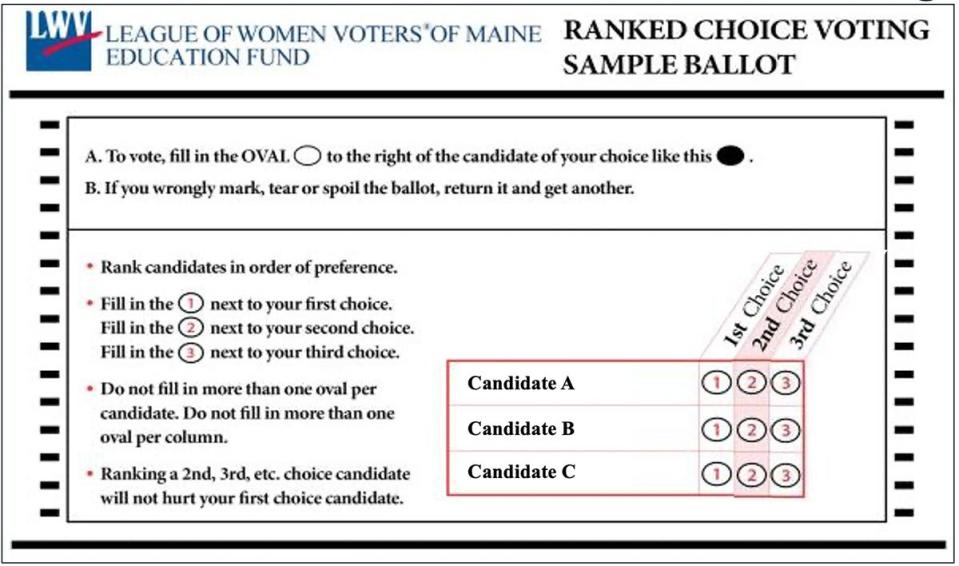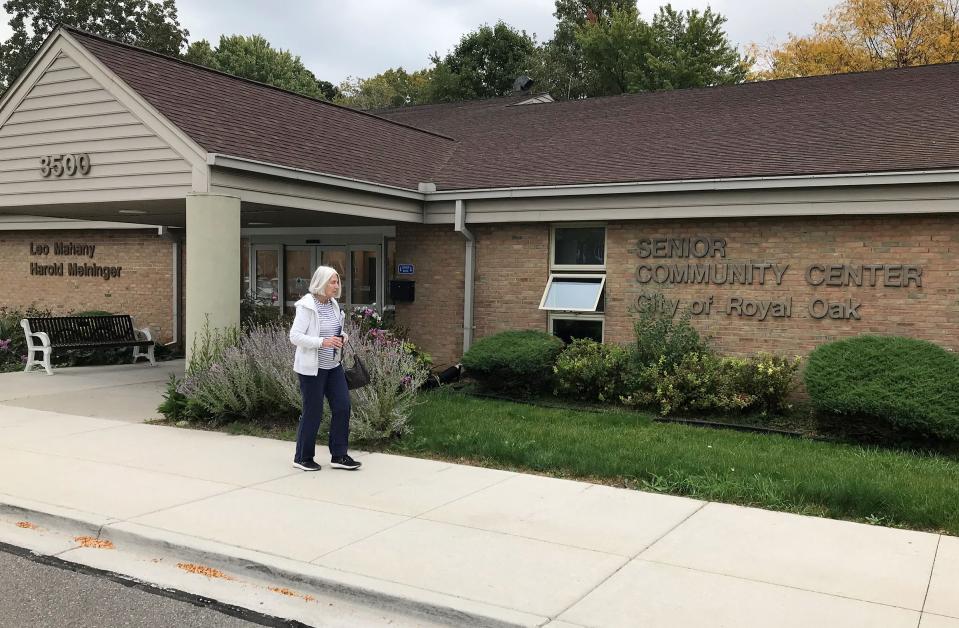Early, ranked choice voting gain attention in Royal Oak, Michigan ahead of 2023 election
What’s rushed, wasteful, repetitive and has limited choices? Of course, fast food.
But critics also cite something far more important: the way Americans vote.
To improve voting in ways that Canada and other nations have done — make it less rushed, less costly to taxpayers, less repetitive and more open to minor candidates — there’s a movement underway. This fall, two new approaches are getting attention in Royal Oak and elsewhere around Michigan:
Early voting is the term for giving people more than just one day to vote. It’s nothing new in other countries. Canadians can vote as early as 10 days before the official election day. Those in Finland can start 11 days ahead. In Royal Oak, voters will get nine days to vote in advance of Election Day on Nov. 7. In nearly two dozen other communities in Oakland County, and in scattered other places such as Westland, election officials are trying early voting this fall, as a rehearsal before Michigan adopts early voting statewide in 2024 — the result of Michiganders passing Proposition 2 in the 2022 election.
Ranked choice voting is an approach that does away with the traditional all-or-nothing system. It caught on in Ireland, Australia, Alaska, Maine, and New York City. Voters mark their first choice, as usual, but also their second choice, third choice, and so on. By a process of elimination, the ultimate winner is more likely to represent what most voters want. Ranked choice also lets minor parties challenge the two-party system because voters who give their first choice to, say, a Libertarian or Green Party candidate, still get to vote for other preferences, avoiding the guilty feeling that “I threw my vote away” on someone who couldn't win.

Ranked choice voting has other advantages, too. It's a time and money saver because it can eliminate the need for holding both a primary and a runoff election. It's sometimes called instant runoff voting. On November ballots in Royal Oak, as well as in East Lansing and Kalamazoo, residents will see a referendum asking whether they want their city to offer ranked-choice voting.

Early voting in Royal Oak will take place at the senior community center, 3500 Marais, near 13 Mile Road, and it will follow a schedule prescribed by state law, said Royal Oak City Clerk Melanie Halas. The poll will open "starting the second Saturday before Election Day, which this year is Oct. 28, and ending on the following Sunday, which will be Nov. 5," Halas said. Hours will be 8:30 a.m.-4:30 p.m. each day "except Thursday, which will be noon to 8 p.m.," she said. Royal Oak is partnering with Madison Heights, whose residents can simply head west on 13 Mile to join in early voting at the same site, and on the same days, at the same times. Those days and hours will be duplicated at numerous locations around Oakland County. For example, residents of Oak Park, Berkley, Huntington Woods, and Pleasant Ridge can try early voting at the Oak Park Community Center, 14300 Oak Park Blvd.
Although the challenger running to unseat the incumbent mayor of Royal Oak has questioned whether Michigan elections are fair and legitimate, Halas is among countless local and county clerks in Michigan who disagree.
"I feel very confident with our election workers and with the integrity of all our elections. After every election, Royal Oak's results are audited by the state of Michigan and also by the Board of Canvassers," said Halas, Royal Oak's city clerk since 2008. With early voting, she added, "we're making voting more accessible for everyone." Election officials with Oakland County "are paying for the extra equipment and the supplies we need," using a state allocation, Halas said.
Michigan judge: Defendants accused in false elector scheme will not have charges dropped
Oakland County's top election official, Clerk Lisa Brown, said it's important to note that early voting doesn't mean early counting. "People should know — their ballot will go through the tabulator and everything will be recorded internally, but no one will be counting those results until the polls close on Election Day at 8 p.m.," Brown said. Early voting has supporters from across the political spectrum, said Oakland University professor of political science Dave Dulio, the author or coauthor of 11 books on politics and elections. Conservative states such as Texas and Georgia have adopted early voting periods, along with liberal-leaning states.
"This is about giving more people more opportunities to vote," Dulio said. Some pundits have said that early voting, in effect, already is available, thanks to the expanding use of absentee ballots. Still, early voting at polling sites is a boon to those who prefer voting in person or who forgot to request an absentee ballot.

The other new approach to voting in Royal Oak is just an idea, so far, but it's a question on the city's November ballots. Voters will be asked whether their city should allow ranked choice voting. Volunteers gathered 3,000 signatures to put that question on city ballots, said Ron Zimmerman, an East Lansing resident who heads the nonpartisan, nonprofit RankMiVote. Ranked choice voting, wherever communities approve it, brings more people out to vote, gives third-party candidates a boost, and reduces negative campaigning because candidates don't want to alienate anyone who might make them a second choice, Zimmerman said. It can even save taxpayer dollars by eliminating some primary elections.
"Lansing looked at more than $100,000 they would've saved by eliminating a recent primary, which had just a 10% turnout," he said. Another vital benefit is that ranked choice voting prevents "unrepresentative outcomes that can arise when more than two candidates run for a single position," according to the website of FairVote.org. To unpack that phrase, Rolling Stone magazine used a scenario of five candidates seeking one political office in mythical Dessert Town — four who like popular strawberry ice cream, one who favors unpopular rum raisin. With usual voting, four candidates would split the strawberry vote, which might allow unpopular rum raisin to eke out a win. But under ranked choice voting, voters would cast second choice, third choice, and fourth choice preferences, mostly for other strawberry candidates. Those votes ultimately would flow to one strawberry winner, ensuring that Dessert Town did not get stuck with, yuck, rum raisin.
Besides being voted on in Royal Oak, ranked choice voting is on ballots this fall in East Lansing and Kalamazoo. When offered to residents of Ann Arbor in 2021, and those in Ferndale in 2004, ranked choice voting got a thumbs-up. Yet, the system has never been implemented anywhere in Michigan, Zimmerman said. (It was used in a 2019 City Council election in Eastpointe under a federal lawsuit settlement.)
"The State Board of Canvassers refuses to approve anyone using it. Obviously, we're hoping to get that changed," he said. If approval doesn't happen, it may take a new state law to implement this form of voting, which lets participants continue with the usual "all or nothing" approach but also allows them to rank their choices — first, second, third, etc.
Inkster mayor: Feds indict Patrick Wimberly in corruption case just weeks before election
In Royal Oak, volunteers are knocking on doors and handing out yard signs in support. They range from recent college grads to senior citizens, and from an auto engineer to a married couple of retired librarians. T.J. Wolfgram, of Ferndale, is a U.S. Army soldier, just ending four years of active duty and heading into the Army Reserve. When it comes to politics, he calls himself "just an interested citizen" who in 2018 helped to organize RankMiVote.
"I thought our system wasn't always producing the most just outcomes," Wolfgram said. Another volunteer, auto engineer Katie Monaghan, of Royal Oak, said she liked ranked choice elections because "I'd like to see candidates doing less attack ads and working to please everybody, which they do when they know they need the second-choice votes." Like early voting, ranked choice voting is another change that gets support from both liberals and conservatives, although liberals tend to embrace it first, Wayne State University professor of political science Kevin Deegan-Krause said.
"Frankly, this is something I've studied but I'm also an advocate for," said Deegan-Krause, who has visited countries in Europe and elsewhere to see ranked choice voting take place. "Our current system of electing is one of the few in the world that allows very little choice beyond winner takes all," he said. Ranked choice voting is beginning to catch on, as more people grasp the idea. Simply put, imagine a "what if" election, Deegan-Krause said.
"Imagine, 'what if the last-place candidate didn't run?' After the results are in, you drop that candidate out and assign their supporters' second-place votes to other candidates, and assign their third-place votes, and so on. The process continues, with more votes shifted around, until a clear winner emerges. Voters are still free to vote for just one person," Dulio said.
"But who, in any situation, doesn't usually have at least a second choice?"
Contact Bill Laytner: blaitner@freepress.com
This article originally appeared on Detroit Free Press: Early, ranked choice voting gain attention in Royal Oak, Michigan

